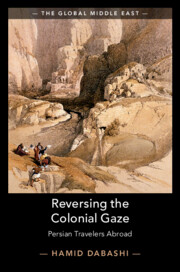Book contents
- Reversing the Colonial Gaze
- The Global Middle East
- Reversing the Colonial Gaze
- Copyright page
- Dedication
- Contents
- Figures
- Preface
- Acknowledgments
- Introduction
- 1 Mr. Shushtari Travels to India
- 2 Mirza Abu Taleb Travels from India
- 3 An Ilchi Wonders about the World
- 4 A Colonial Officer Is Turned Upside-Down
- 5 A Shirazi Shares His Travelogues
- 6 A Wandering Monarch
- 7 Hajj Sayyah Leads a Peripatetic Life
- 8 In the Company of a Refined Prince
- 9 A Wandering Mystic
- 10 In and out of a Homeland
- 11 The Fact and Fiction of a Homeland
- 12 Professor Sayyah Comes Home to Teach
- Conclusion
- Index
Introduction
Published online by Cambridge University Press: 19 December 2019
- Reversing the Colonial Gaze
- The Global Middle East
- Reversing the Colonial Gaze
- Copyright page
- Dedication
- Contents
- Figures
- Preface
- Acknowledgments
- Introduction
- 1 Mr. Shushtari Travels to India
- 2 Mirza Abu Taleb Travels from India
- 3 An Ilchi Wonders about the World
- 4 A Colonial Officer Is Turned Upside-Down
- 5 A Shirazi Shares His Travelogues
- 6 A Wandering Monarch
- 7 Hajj Sayyah Leads a Peripatetic Life
- 8 In the Company of a Refined Prince
- 9 A Wandering Mystic
- 10 In and out of a Homeland
- 11 The Fact and Fiction of a Homeland
- 12 Professor Sayyah Comes Home to Teach
- Conclusion
- Index
Summary
In the Introduction, I give an outline of the entire book and its chapter progression, mapping out the way in which the book will unfold. It begins by addressing the manner in which we need to rewrite the history of the nineteenth century around the globe via serious epistemic reconsideration of our prior assumptions, in this case the false presupposition that these travelers just went to Europe. This unwarranted privileging of Europe has performed irreparable epistemic violence on non-European histories. A crucial part of the Introduction concerns the necessity of righting this epistemic wrong and thereby discovering a cosmopolitan worldliness otherwise hidden or ignored in the travelogues we will examine in this book. The Introduction further introduces the idea of traveling as a metaphor that is both substantive and allegorical. Here I show how carefully I have selected each of these texts and for what specific reasons, for the particular angle they offer on how to read the spirit of the age they document. Each one of these texts has a specific peculiarity hitherto lost to those who have occasionally read and sought to understand them with a prior intention to see how “the West” is depicted in them, or else how Muslims “discovered” “the West.” When we falsely assume the intention of these travelers was to “discover” Europe, we gloss over the multiple worlds they visited and narrated in the body of their texts, each in a slightly different way. It is the particularities of those worlds, or what you will see me identify as their “cosmopolitan worldliness,” that inform the totality of the texts I have selected and placed in this narrative, informed by the content of these books, not imposing a misplaced destination on them. In the Introduction I propose the authors of these texts were only subconsciously aware and informed by the world they thus inhabited. My intention is to bring that unconscious world into full consciousness – document, analyze, and theorize it. This, perhaps, is my singular ambition in writing this book.
Keywords
- Type
- Chapter
- Information
- Reversing the Colonial GazePersian Travelers Abroad, pp. 1 - 24Publisher: Cambridge University PressPrint publication year: 2020



